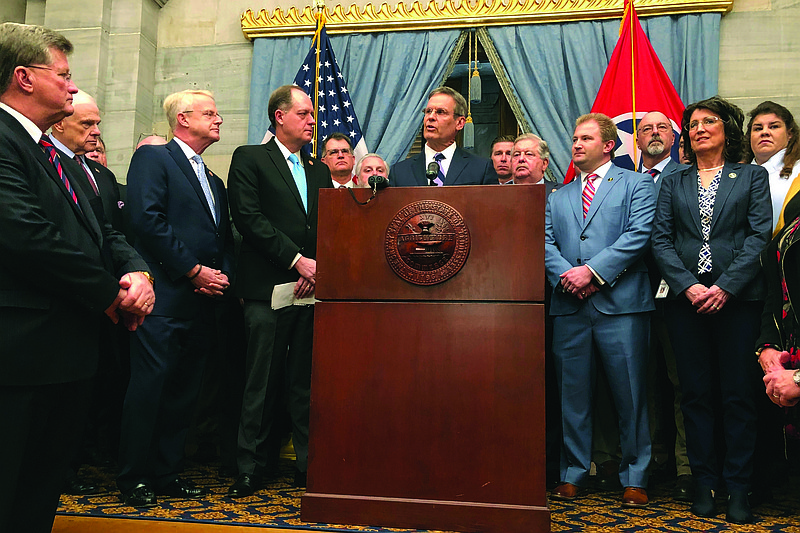NASHVILLE - Tennessee lawmakers wrapped up their annual meeting on Friday, but Gov. Bill Lee is already weighing calling them back into special session after the last-minute collapse in the House of a business-backed bill to provide retroactive legal immunity from civil lawsuits related to the coronavirus.
"Conversations about the prospect of special session are ongoing, and we will have more to say about that next week," said Laine Arnold, the Republican governor's spokesperson, on Friday, hours after lawmakers adjourned for the year.
The coronavirus litigation bill, dubbed the "Tennessee Recovery and Safe Harbor Act," received 46 votes but required 50 for passage. A number of House majority Republicans voted against it.
It was championed by the Tennessee Chamber of Commerce & Industry and a 30-member coalition of business, education and nonprofit organizations.
Sponsored by Senate Judiciary Committee Chairman Mike Bell, R-Riceville, it sought to provide qualified retroactive legal immunity from COVID-19 lawsuits for businesses, school, churches and nonprofit groups dating back to March 5, the first reported case of the coronavirus in Tennessee.
It elevated the legal standard by which judges and juries would consider the cases from negligence to "gross negligence or willful misconduct." And it linked that to whether businesses were dealing with nonexistent guidelines or, later, constantly changing public health directives.
A number of Republicans, including Majority Leader William Lamberth of Portland, an attorney, questioned its legality under the Tennessee Constitution's Article I, Section 20, which says "no retrospective law, or law impairing the obligations of contracts, shall be made."
After it failed, angry Republican majority senators adjourned without taking up a telemedicine insurance-reimbursement bill sponsored by House Insurance Committee Chairwoman Robin Smith, R-Hixson. Her bill was strongly supported by House Speaker Cameron Sexton, R-Crossville.
A revised version of the telemedicine bill had been agreed to previously by a House and Senate conference committee. It provides "payment parity" on insurance reimbursements between in-person and teleconferencing encounters between patient and health care provider.
Known as telemedicine, the technology has come into its own during the coronavirus pandemic under emergency orders. Chattanooga-based BlueCross BlueShield of Tennessee has decided to implement the technology on a permanent basis. Other health insurers, however, have not.
As Lee, a Republican, eyes trying to bring peace and resolution, Lt. Gov. Randy McNally, the Republican Senate speaker from Oak Ridge, issued a statement on Friday putting down his marker, at least initially, on a special session.
"If a pressing need for a special session exists, it is for one issue and one issue only. That issue is COVID-19 liability protection," he said in the statement, later put out on Twitter.
McNally said the coronavirus pandemic "brought burdens upon us all but nothing like what has befallen small business owners. Many are teetering on the edge of bankruptcy. Jobs are being lost and lives destroyed. A legal judgment, or even just a costly legal battle, over a pathogen business owners could not possibly control would be devastating."
He went on to say, "The failure of the House to pass legislation protecting our state's businesses has created an opportunity for trial lawyers seeking a payday to disrupt our economy and put people out of work."
In a blast at Lamberth and the bill sponsor, House Judiciary Committee Chairman Michael Curcio, R-Dickson, McNally said they "cobbled together a cabal of Democrats and attorneys to defeat the legislation and place our entire economy in danger. It was irresponsible and dangerous. I would absolutely support a call for a special session by our governor for this issue and this issue alone."
Still, some believe McNally isn't entirely ruling out taking up Smith's telemedicine bill if it results in passage of the COVID-19 liability bill.
Meanwhile, Sexton, who voted for the COVID-19 lawsuit bill, was put out with the Senate.
"I think if you listened to debate, the House wasn't in agreement with the blanket retroactivity of it," Sexton said in a Times Free Press interview.
Senate leaders, Sexton said, were warned there were problems after a Senate and House conference committee left in language providing retroactive protection to business owners.
"So we put it up for a vote, tried to communicate and we were hopeful they would take up the telemedicine conference committee report, and at the end, they wouldn't even take it up for a vote," Sexton said.
In a statement issued later Friday, Sexton said the "House was and remains fully prepared to work to provide critical protections for our businesses and for Tennesseans during the challenges resulting from COVID-19.
Sexton added that "I remain committed to working with them in the future for the benefit of the business community, as well as other institutions and the people of our state."
Contact Andy Sher at asher@timesfreepress.com.
